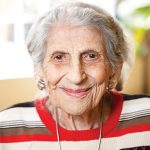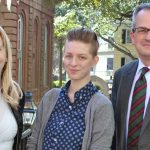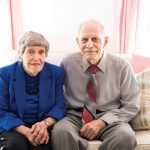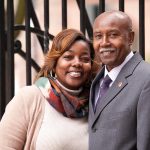Archives For November 30, 1999
Last year, the U.S. Department of Defense (DoD) awarded junior Courtney Beckham with the DoD SMART Scholarship, securing funding for her tuition for her final two years of school and a job for her first two years after graduation. It also means she receives an annual stipend and an 8–12-week internship with her sponsoring facility next summer.
“I’ll be getting a feel for the workplace and the type of job I’ll have upon graduation,” says Beckham, a math major in the Honors College, whose sponsoring facility is the Defense Intelligence Agency. “It will help me prepare not only for my job in the future, but also going into my senior year to determine what area of mathematics I want to hone in on, and to help me figure out any specific classes I might want to take that are more advantageous to the field that I’ll be going into.”
The DoD SMART Scholarship is awarded to graduate and undergraduate students in STEM fields with the goal of increasing civilian participation within the DoD.
It’s not on the National Register of Historic Places. It wasn’t built or owned by some prominent 19th-century Charlestonian. It doesn’t lay claim to any state-of-the-art student-focused attributes. In fact, it was never even intended for students. In many ways, it’s the College’s architectural and aesthetic black sheep. But for the thousands of students who’ve called it home, there’s no place quite like College Lodge.
This sentiment certainly holds true for Kristen Faretra Bowden ’95, who lived in College Lodge for four of her five years as a CofC student. Many of Kristen’s best memories at the College of Charleston involve College Lodge. That’s why she and her husband Greg created the 402 Scholarship in celebration of College Lodge. The name honors Kristen’s old room number: 402.
As the first scholarship in the College’s history to support students in a particular residence hall, the Bowdens’ gift is proof that philanthropy can be fun!
Sure, College Lodge is still a little at odds with the rest of buildings on campus, but residents past and present agree that there is no place like College Lodge. Thanks to the Bowdens, this quirky residence hall can also lay claim to the one and only residential hall scholarship at the College of Charleston
Hilda Debacker, a much-admired professor emeritus of neuro-anatomy at MUSC, is honoring her late husband and supporting CofC students with the Rene and Hilda Debacker Endowed Scholarship, a legacy commitment to the College of Charleston.
A 92-year-old professor emeritus at the Medical University of South Carolina who enjoyed a career powered by the brain, teaching neuro anatomy for almost 30 years, Hilda Debacker continues to crackle with sharp observations, holding forth with wry wit on life and career as well as the entwined roots of the extended family she and her late husband, Rene, established in their beloved adoptive city of Charleston. Recently, she has also focused her thoughts on supporting the College of Charleston. Honoring the wishes of her husband, who died in 1997, she announced the Rene and Hilda Debacker Endowed Scholarship, a legacy commitment to the College that provides merit-based support for students from Charleston County, S.C.
Debacker knows firsthand how scholarships can transform the lives of those students who need them: It was thanks to a Regents Scholarship, New York State’s merit-based scholarship, that enabled her to attend Cornell University. She won an additional scholarship, as well, and thus covered all of her tuition and costs. With those credentials, she was primed to continue her studies in Charleston, and eventually embark on a long and deeply rewarding teaching career there.
Many years after retiring from teaching, Debacker still enjoys frequent interactions with students from decades ago. Like the network of nerves branching out from the brain, the network the Debackers created throughout their lives continues to reach far and wide. As beloved partners, committed mentors and considerate philanthropists, the Debackers have much to teach us about family, living and giving.
A week after Alison Piepmeier passed away, people came forth to create the Alison Piepmeier Scholarship, which will be awarded annually to a full-time studentmajoring or minoring in women’s and gender studies who has demonstrated arecord of feminist activism and leadership.
Piepmeier, who created the College’s Women’s and Gender Studies Program and directed the program for over a decade, passed away last December after a six-yearstruggle with brain cancer. She was a beloved activist, advocate, mentor, mother andfriend, and her legacy lives on through the Alison Piepmeier Scholarship. Leigh Friar ’17 is the first recipient of that scholarship.
“Dr. Piepmeier had a significant influence on me – not only on my academic career but on my personal growth,” says Friar, who plans to continue gender and sexuality studies at the graduate level and one day get a Ph.D. in social work and to teach and inspire others, just as Piepmeier did.
“I watched as Dr. Piepmeier inspired students to unapologetically carve out space for themselves,” says Friar. “I want to focus my teaching career on ethics in social work and intersectionality in academia.”
Eugene and Rose Gangarosa believe in getting a head start. They know how important it is to begin early. They’ve seen how much can be accomplished when you have a strong lead. It is, they say, amazing how far you can go when you start from the beginning.
For the Gangarosas, it all started in Rochester, N.Y., where they grew up across the street from each other. From the very beginning, the two first-generation American children were familiar parts of one another’s lives. Still, Rose, the daughter of an Italian barbershop owner, didn’t know quite the same poverty that Eugene experienced. The son of a Sicilian stonecutter who was in and out of work, Eugene is the 12th of 13 children – only five of whom survived because they had to ration water.
That’s where it all started: the driving force for the Gangarosas’ lifelong efforts championing public health and safe water initiatives.
After marrying his childhood sweetheart, Eugene served at the Walter Reed Army Institute of Research, where he laid the foundation for the cholera treatment that drastically reduced infant mortality. He went on to teach and research at the Pakistan Medical Research Center and then served as the Center for Disease Control’s director of the Epidemic Intelligence Service, chief of the Enteric Diseases Branch and deputy director of the Bacterial Diseases Division. After a stint as the dean of the American University of Beirut, Eugene began teaching at Emory University, where he helped transform the public health graduate program into the Rollins School of Public Health.
Now a emeritus professor in the Hubert Department of Global Health at Rollins, Eugene is considered a public health legend – and both he and Rose are globally recognized as historic pioneers in the field. Together the two founded the Gangarosa International Health Foundation, which for years has funded global field experiences for Rollins students – and, starting last year, for students in the public health program at the College of Charleston, as well.
It all started with the Gangarosas’ son, Paul, a faculty member in the College’s Department of Health and Human Performance, who suggested the idea to his father.
Eugene and Rose Gangarosa believe in getting a head start. They know how important it is to begin early. They’ve seen how much can be accomplished when you have a strong lead. It is, they say, amazing how far you can go when you start from the beginning.
For the Gangarosas, it all started in Rochester, N.Y., where they grew up across the street from each other. From the very beginning, the two first-generation American children were familiar parts of one another’s lives. Still, Rose, the daughter of an Italian barbershop owner, didn’t know quite the same poverty that Eugene experienced. The son of a Sicilian stonecutter who was in and out of work, Eugene is the 12th of 13 children – only five of whom survived because they had to ration water.
That’s where it all started: the driving force for the Gangarosas’ lifelong efforts championing public health and safe water initiatives.
After marrying his childhood sweetheart, Eugene served at the Walter Reed Army Institute of Research, where he laid the foundation for the cholera treatment that drastically reduced infant mortality. He went on to teach and research at the Pakistan Medical Research Center and then served as the Center for Disease Control’s director of the Epidemic Intelligence Service, chief of the Enteric Diseases Branch and deputy director of the Bacterial Diseases Division. After a stint as the dean of the American University of Beirut, Eugene began teaching at Emory University, where he helped transform the public health graduate program into the Rollins School of Public Health.
Now a emeritus professor in the Hubert Department of Global Health at Rollins, Eugene is considered a public health legend – and both he and Rose are globally recognized as historic pioneers in the field. Together the two founded the Gangarosa International Health Foundation, which for years has funded global field experiences for Rollins students – and, starting last year, for students in the public health program at the College of Charleston, as well.
It all started with the Gangarosas’ son, Paul, a faculty member in the College’s Department of Health and Human Performance, who suggested the idea to his father.
“Paul started the ball rolling, and whenever Paul gets excited, we get fired up, too,” laughs Eugene, who visited the College to speak to Paul’s public health students. “The students I met that day were exceptional. The level of enthusiasm they had was infectious, and the interaction I had with them was impressive. They were of the same caliber as the students at the Rollins School.”
– Eugene Gangarosa
Thus began the Safe Water International Internship at the College, which has so far funded a trip to Haiti for two students, including public health major Maclain Borsich.
“This experience was the perfect example of global health in action,” says Borsich, who hopes to continue studying public health at the Rollins School.
“Having this opportunity for our students is simply wonderful,” says Fran Welch, dean of the School of Education, Health, and Human Performance, noting that the Rollins School has been a great resource for the College’s new program, which was established in 2012. “We’re most thankful for the Gangarosa family and its contributions to the program, the College and the world.”
Noting that the College’s public health “program is equally impressive as the Rollins program when it was first beginning,” Eugene believes that global field studies are essential to improving not just students’ learning, but the world’s health, too. After all, it was the Gangarosas’ own field experiences that inspired their lifelong dedication to safe water.
For Rose, it started with the canal in Pakistan that she had to cross to get to the Lahore American School, where she taught high school English and served as principal: “It was the most polluted water I’d ever seen. And they used this water for everything: baths, laundry, brushing their teeth, drinking. The animals were in it. That just really, really impressed me a good bit. I came home one day and said, ‘I wish there was something I could do. Everybody should have safe water.’ Water is the most important thing in life. You can’t live without it. My hope is that no one has to see the pollution I saw in that canal in Pakistan.”
“Rose and I both had experiences that led us to believe that everyone should have the right to safe water,” says Eugene. “We hope for equality in health all over the world. And water is the starting point.”
“From there, it all falls into place,” agrees Rose, citing that educating women in third-world countries about water and sanitation has also been crucial, because women provide the water in the homes and are teaching their children. “These women are now educated and passing the torch. I’m glad to have had a part in that.”
“We’ve saved the lives of a lot of people whose faces we will never see, but we’re equally proud of the people who have continued to save lives through education. We have watched them bloom and become leaders, and that multiplying effect is the best investment we could possibly make,” says Eugene. “They are carrying the torch from generation to generation.”
It just shows how far you can go when you get off to a good start.
Andrew Lewis Sr. and his wife Josephine created the newly endowed Dr. Andrew and Josephine Lewis Endowed Scholarship for the School of Education, Health, and Human Performance (EHHP).
Now an associate professor emeritus in the College of Charleston’s Department of Health and Human Performance, Andrew Lewis has worked at the College for 36 years, serving as associate dean of the EHHP; associate professor and chair of health and human performance; interim assistant dean for undergraduate studies and director of the Office of Professional Development in Education. When he became chair of the Department of Health and Human Performance in 1991, he made history as the College’s first African American department chair.
A former member of the Cougar Club Board, he and his wife Josephine established the Dr. Andrew and Josephine Lewis Scholarship at the College in 2010. Earlier this year, he and Josephine endowed the scholarship, which gives African American students in the EHHP’s Department of Health and Human Performance a step up. It is the Lewises’ hope that students of similar backgrounds can have the same opportunities that Andrew has had.
Jimmy Worthy is the first recipient of the endowed scholarship. A senior majoring in physical education, Worthy is also a member of the Call Me MISTER Program at the College and a past member of SPECTRA Program.
“Mr. Worthy is a very personable young man with exceptional talents,” says former S.C. Rep. Floyd Breeland, who directs the Call Me MISTER Program. “He has a wonderful sense of humor and is most responsible, cooperative, generous and sincerely honest in his convictions. He gets along well with other people and is highly respected by his schoolmates and all who know him.”
Worthy is clearly, well, worthy of the investment that the Lewises have made in him and his education. And – as scholarship benefactors, members of the 1770 Society and the Live Oak Society and lifelong education advocates at the College of Charleston – the Lewises are certainly worthy of celebration!








